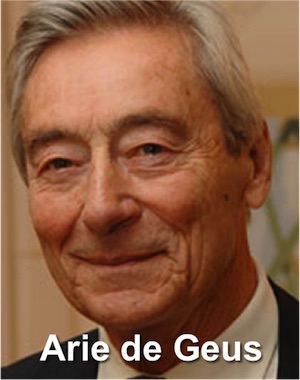James Dean or Kirk Douglas? Jimi Hendrix or Vera Lynn? Why do some people die young and other live long and productive lives? Arie de Geus, who himself is living a long and productive life, asked the same question of companies. And the answer he got was, like the long-lived companies, unexciting, cautious, yet robust.

Short Biography
Arie de Geus was born in 1930, in Rotterdam in the Netherlands. While studying for his doctorate in Business Administration at the Nederlandse Economische Hoogeschool (now, Erasmus University) in Rotterdam, he started working at Royal Dutch Shell to support himself through his studies.
His career at Shell was long and successful. Over 38 years he took a number of regional and corporate roles. They culminated with leadership of Shell’s Group Planning Department, famous for its innovations in Scenario Planning. There, he focused his attention on Portfolio Analysis and Organisational Decision-making. He concluded that organisational learning was a key to successful decisions and corporate longevity.
He developed this theme in a Harvard Business Review article in 1988, ‘Planning as Learning’. When de Geus retired from Shell in 1989, he rapidly got involved with the newly founded Center for Organizational Learning, at MIT, joining Chris Argyris, and Edgar Schein among its advisors, and Peter Senge, as its first Director. In 1997, he wrote the book that has brought him most prominence: ‘The Living Company’.
The Living Company
In his research, de Geus found that the average life expectancy of European and Japanese companies is 12.5 years. For large multi-nationals, it is between 40 and 50 years. Why then, are some able to last hundreds of years? De Geus argues that all have a potential life of 200 to 300 years, and he set out to learn the secrets of those who have achieved it.
His principal conclusion is simple. The problem is profits. Or, more accurately, it is a short-term focus on building profits, at the cost of a longer-term focus on all aspects of the business. Chief among the long-term aspect, de Geus highlights the need to nurture people. How a long life, a business needs to prioritise human capital over financial capital.
The title of his book arises from two hypotheses de Geus sets out:
- A company is (in some ways) a living being
- The decisions made by the company are a result of a learning process
Therefore, for the living being to thrive, it must continually learn, and build on what it has, rather than constantly seek to throw out the old, and with it, the organism’s accumulated wisdom.
Other factors he found, which characterise the long-lived companies he studied, are:
- sensitivity to their environment
- cohesive, with a strong sense of identity
- tolerant of experimentation
- frugal financing decisions
He uses these to carry forward his metaphor of companies being like living organisms, in suggesting that these characteristics also represent successful survival strategies for real living creatures.
Context
Without a doubt, de Geus sets out a corporate, rather than entrepreneurial growth agenda. And his approach to human capital aligns him with other proponents of the human side of the enterprise, starting with people like Follett, Owen, Mayo, and McGregor.
His analysis is also more nuanced and less of a ready-recipe, than the book that followed it a few years later and also looked at long-lived companies: ‘Built To Last’ by Jim Collins and Jerry Porras. Perhaps the biggest difference is that, while de Geus saw average companies as lasting up to fifty years, and targeted longevity on 200-300 years. Collins was interested, in Built to Last, on those that make it past the 50 year mark. Maybe de Geus would see these as merely promising adolescents.
